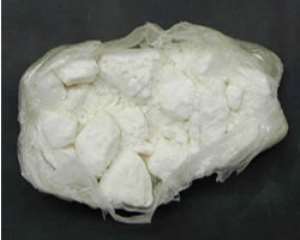
The Accra-based businesswoman who allegedly imported 71.45 kilogrammes of cocaine into the country was given an early Christmas on Wednesday when she was acquitted and discharged by the Accra Fast Track High Court after being in custody for nine months.
The court said it found it unsafe to convict the woman, Augustina Abu, on the two counts of engaging in criminal conspiracy and importation of narcotic drugs without licence, indicating that the prosecution failed to prove its case.
The court has consequently, ordered the court registrar to release to Mrs Abu proceeds from the sale of the container of chewing gum in which the cocaine was found as well as return two boxes of chewing gum which were tendered in evidence during the trial.
Some unspecified and unnamed accomplices charged with Mrs Abu for engaging in criminal conspiracy and are alleged to be at large and beyond the jurisdiction of the court, were also discharged since the court held that there was no evident before the court against them.
The final verdict by the Appeal Court judge, Justice Samuel Marful-Sau, at exactly 1p.m. was received with deafening applause and cheers from friends and family members who had crowded the courtroom.
The jubilation started mid-way through the judgement when the crowd suddenly rose from their seats amidst shouts for about 20 seconds following the declaration that Mrs. Abu had been acquitted and discharged on the count of conspiracy.
The jubilation went into full gear immediately the judge exited the courtroom. The crowd rushed on Mrs. Abu who sat quietly and composed to hug, greet and pour powder on her for the victory after nine months trial.
Some family members, who apparently could not believe what was happening in the midst of the jubilation, broke down in tears as they hugged Mrs. Abu in turns, while others had their mobile phones stuck to their ears apparently relaying the verdict to friends and relatives.
With regard to the two charges, the court was of the view that the prosecution failed to adduce direct evidence to establish that Mrs. Abu indeed, agreed with others to act or import narcotic drugs and subsequently imported narcotic drugs.
According to the court, the evidence adduced by the nine prosecution witnesses was circumstantial which could not be relied on to convict Mrs Abu.
On the count of engaging in criminal conspiracy, the court held that the submission by the prosecution, and for that matter its case, was not borne out of the evidence given before the court. It held that the prosecution failed in its bid to prove that Mrs. Abu agreed to act with the others said to be at large and beyond the jurisdiction of the court, saying “no evidence was led on record”.
It described as speculative and with no legal basis, submissions made by the prosecution. The court contended that the evidence given by the prosecution in respect of the conspiracy charge was a conjecture.
Considering all those issues and the fact that Mrs. Abu never travelled to Ecuador, and the fact that two of the three seals on the container had been tempered with at the time of arrival, among others, the court said it could not convict Mrs. Abu on the charge of conspiracy.
Touching on the second count of importing narcotics without licence, the court contended that the prosecution failed to establish that Mrs. Abu owned the two black bags in which the cocaine were found; she had knowledge of the cocaine and facilitated the importation.
According to the court, all that the prosecution was able to prove was the fact that the container belonged to Mrs. Abu, and since she was the owner, the two black bags found with the cocaine belonged to her as well.
It said that from the prosecution's evidence, it could be deduced that the company that supplied the chewing gum was an accomplice, however, the prosecution failed to extend its investigation to the company.
The court held that all the prosecution did was to let the court assume that since Mrs. Abu was the consignee of the container, everything in it belonged to her but said evidence showed that Mrs. Abu imported chewing gums as normal business and not cocaine.
Mrs. Abu was arrested in March, this year, after a Joint Port Control Unit at the Tema Port intercepted her 40-footer container with packs of chewing gums among which were the parcels of cocaine.
Source: The Ghanaian Times/Ghana




 Whoever participated in the plunder of the state must be held accountable – Jane...
Whoever participated in the plunder of the state must be held accountable – Jane...
 A vote for John and Jane is a vote to pull Ghana from the precipice of destructi...
A vote for John and Jane is a vote to pull Ghana from the precipice of destructi...
 I’ll repay your abiding confidence with loyalty, understanding and a devotion to...
I’ll repay your abiding confidence with loyalty, understanding and a devotion to...
 ‘I’ve learnt deeply useful lessons for the future' — Serwaa Amihere breaks silen...
‘I’ve learnt deeply useful lessons for the future' — Serwaa Amihere breaks silen...
 I’m sorry for the embarrassment – Serwaa Amihere apologises for leaked sex video
I’m sorry for the embarrassment – Serwaa Amihere apologises for leaked sex video
 Dumsor: Matthew Opoku Prempeh not in charge of Energy sector – Minority
Dumsor: Matthew Opoku Prempeh not in charge of Energy sector – Minority
 Adu Boahen’s murder: Police arrest house help who was in possession of deceased’...
Adu Boahen’s murder: Police arrest house help who was in possession of deceased’...
 Akufo-Addo nominates Felicia Attipoe as Tema West MCE
Akufo-Addo nominates Felicia Attipoe as Tema West MCE
 Election 2024: I can't have someone I defeated twice as my successor – Akufo-Add...
Election 2024: I can't have someone I defeated twice as my successor – Akufo-Add...
